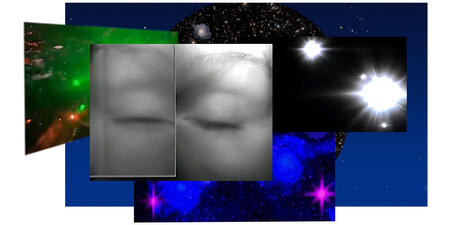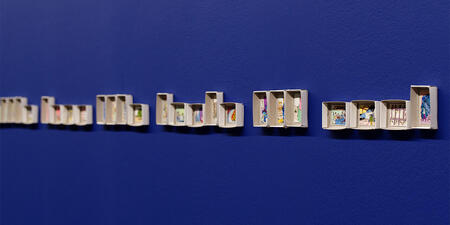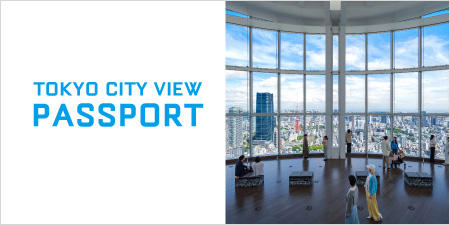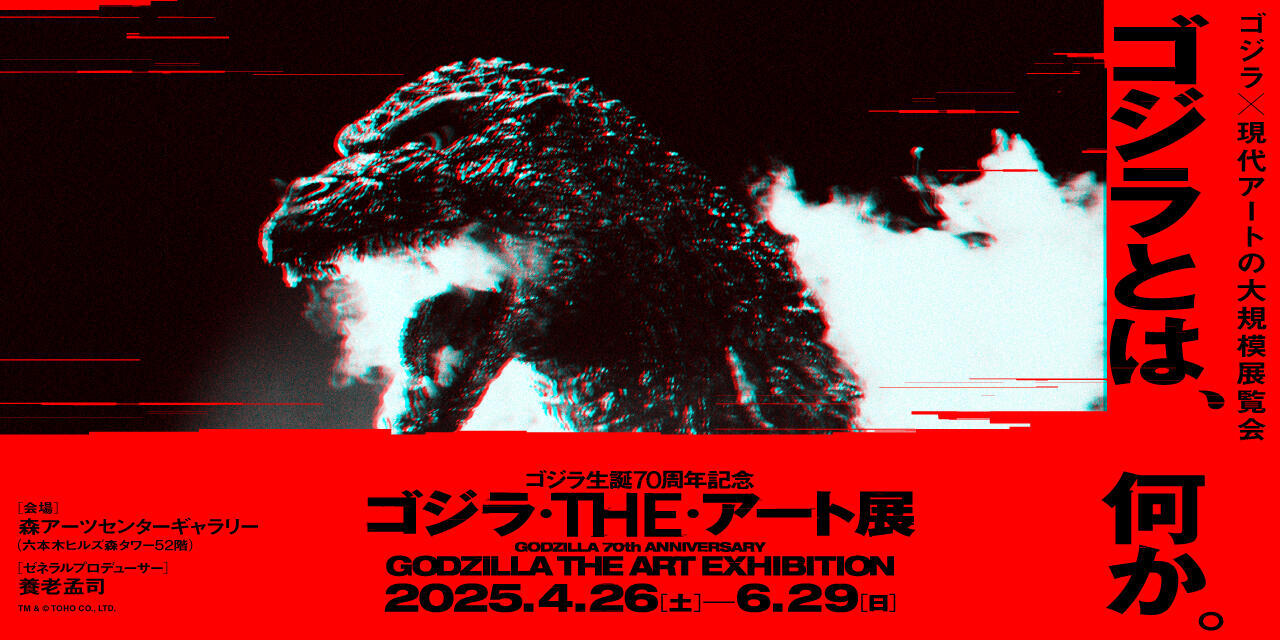Bourgeois’s largest ever solo exhibition in Japan and her first in 27 years
About 80% of the works are being shown in Japan for the first time
This is Bourgeois’s first solo exhibition in Japan since 1997, and will showcase more than 100 works, including sculptures, paintings, drawings, fabric works, and installations.
Bourgeois continued to create artworks until her death at the age of 98, and during her final years produced many works that might be considered some of the most iconic of her career. About 80% of the works in this exhibition, such as her fabric works will be on view for the first time in Japan.
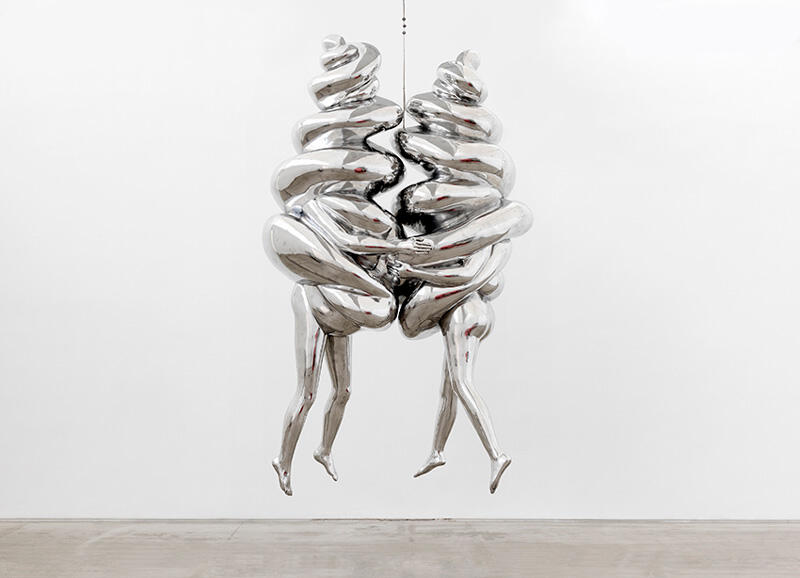
The Couple
2003
Aluminum
365.1 x 200 x 109.9 cm
Photo: Christopher Burke
© The Easton Foundation/Licensed by JASPAR, Tokyo, and VAGA at Artists Rights Society (ARS), New York

The Couple
2003
Aluminum
365.1 x 200 x 109.9 cm
Photo: Christopher Burke
© The Easton Foundation/Licensed by JASPAR, Tokyo, and VAGA at Artists Rights Society (ARS), New York
Display of early paintings that are attracting global attention
The exhibition will feature a selection of paintings Bourgeois made during the first 10 years after moving to New York City. This important body of work has been reevaluated in recent years with focused exhibitions at the Metropolitan Museum of Art (New York, 2022) and Belvedere Museum (Vienna, 2023-2024). More than ten of these paintings will be on view in Asia for the first time.
In 1938, Bourgeois married American art historian Robert Goldwater in Paris and moved to New York. The paintings she produced in these early years established many of the motifs that she would go on to explore over the next six decades: self-portraits, houses, references to France and family left behind, and an iconography of nature and architecture, including the “Femme Maison” series, in which the top half of a woman is obscured by a building which both imprisons and protects her. These last paintings were championed by the feminist art movement in the 1960s-70s, and are among the most iconic of her oeuvre.

Fallen Woman (Femme Maison)
1946-1947
Oil on linen
35.6 x 91.4 cm
Photo: Christopher Burke
© The Easton Foundation/Licensed by JASPAR, Tokyo, and VAGA at Artists Rights Society (ARS), New York

Fallen Woman (Femme Maison)
1946-1947
Oil on linen
35.6 x 91.4 cm
Photo: Christopher Burke
© The Easton Foundation/Licensed by JASPAR, Tokyo, and VAGA at Artists Rights Society (ARS), New York

The Runaway Girl
circa 1938
Oil, charcoal, and pencil on canvas
61 x 38.1 cm
Photo: Christopher Burke
© The Easton Foundation/Licensed by JASPAR, Tokyo, and VAGA at Artists Rights Society (ARS), New York

The Runaway Girl
circa 1938
Oil, charcoal, and pencil on canvas
61 x 38.1 cm
Photo: Christopher Burke
© The Easton Foundation/Licensed by JASPAR, Tokyo, and VAGA at Artists Rights Society (ARS), New York
Introduction of the works featuring spiders and the public artwork Maman, the symbol of Roppongi Hills
From a small 1947 drawing to the much later and larger sculptures in bronze, the spider is an iconic motif in Bourgeois’s art. For her, the spider was a symbol of her mother, a weaver who oversaw the family tapestry workshop and a calm, diligent force whom Bourgeois characterized as her “best friend.” The complexity of motherhood is conveyed through a spider that is both a repairer, healing wounds with its threads, and a menacing predator. It is also a self-portrait: the spider produces its web from its body, much as Bourgeois made art in relationship to her body and as a reaction to her inner anxieties and emotions.

Maman
1999/2002
Bronze, stainless steel, marble
9.27 x 8.91 x 10.23 m
Collection: Mori Building Co., Ltd., Tokyo

Maman
1999/2002
Bronze, stainless steel, marble
9.27 x 8.91 x 10.23 m
Collection: Mori Building Co., Ltd., Tokyo
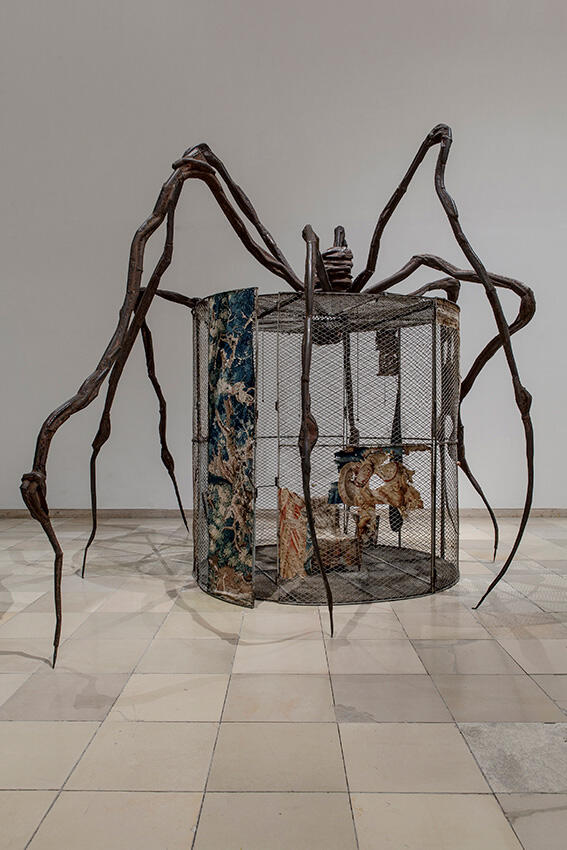
Spider
1997
Steel, tapestry, wood, glass, fabric, rubber, silver, gold, and bone
449.6 x 665.5 x 518.2 cm
Photo: Maximilian Geuter
© The Easton Foundation/Licensed by JASPAR, Tokyo, and VAGA at Artists Rights Society (ARS), New York

Spider
1997
Steel, tapestry, wood, glass, fabric, rubber, silver, gold, and bone
449.6 x 665.5 x 518.2 cm
Photo: Maximilian Geuter
© The Easton Foundation/Licensed by JASPAR, Tokyo, and VAGA at Artists Rights Society (ARS), New York
Bourgeois’s writings and statements that express her inner life will be presented in the exhibition
Bourgeois was also a gifted writer. She left a vast archive of diaries and letters, as well as hundreds of texts, now known as the psychoanalytic writings, made during her time in analysis. These revelatory writings mine complex emotional and psychological states: anxiety, anger, jealousy, murderous hostility, guilt, compassion, gratitude, and love. Excerpts from Bourgeois’s writings in various formats will complement her artworks throughout the galleries.
Presentation of Jenny Holzer’s projections using Bourgeois’s words
Jenny Holzer (born 1950 in Ohio, USA), internationally known for her conceptual artworks that feature words and phrases, developed a friendship with Bourgeois in the late 1990s. Inspired by her strong interest in Bourgeois’s writings, Holzer curated an exhibition of Bourgeois’s work, much of which had textual elements, at Kunstmuseum Basel in 2022. She also projected excerpts from Bourgeois’s writings on the facades of buildings scattered throughout the city of Basel. A series of new projections created for the Mori Art Museum, which also uses Japanese translations, will be on display in the exhibition.
In addition, footage of Bourgeois’s seminal performance, A Banquet / A Fashion Show of Body Parts, which took place inside her gallery-sized installation, Confrontation, in 1978, features the underground artist Suzan Cooper (1952-2023), and will also be shown in this exhibition.
History of Bourgeois’s practice and display of archival materials
A 10m long chronology of Bourgeois’s 98-year life and career will be presented along with a selection of archival materials. The exhibition includes her psychoanalytic writings, ephemera and exhibition announcements, an autobiographical film, and a bottle of Guerlain’s “Shalimar” fragrance, a favorite of Bourgeois’s. Visitors can experience the scent in the chronology section.



